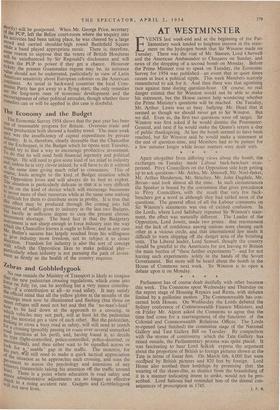AT WESTMINSTER
VENTS last week-end and at the beginning of the Par- -1 liamentary week tended to heighten interest in the state- ment on the hydrogen bomb that Sir Winston made on Tuesday. There was the visit of Mr. Stassen, Lord Cherwell and the American Ambassador to Chequers on Sunday, and news of the dropping of a second bomb on Monday. Before the Prime Minister rose to speak on Tuesday, the Economic Survey for 1954 was published—an event that in quiet times causes at least a political ripple. This week Members scarcely remembered to ask for it. And then there was that agonising race against time during question-hour. Of course, no real danger existed that Sir Winston would not be able to make his statement, but the House cannot help wondering whether the Prime Minister's questions will be reached. On Tuesday, Mr. 'Arthur Lewis was so busy bullying Mr. Head that it seemed as though we should never get to Sir Winston. But we did. Even so, the first two questions were off target. Sir Winston was first asked if he would dismiss the Postmaster- General, and next if he would make the Queen's return a day of public thanksgiving. At last the bomb seemed to have been reached, but Sir Winston said he would make a statement at the end of question-time, and Members had to be patient for a few minutes longer while lesser matters were dealt with.
* * Apart altogether from differing views about the bomb, the . exchanges on Tuesday made Labour back-benchers exas- perated. Privy Councillors on the Opposition side kept getting up to ask questions—Mr. Attlee, Mr. Shinwell, Mr. Noel-Baker, Mr. Arthur Henderson, Mr. Strachey, Mr. John Dugdale, Mr. Bevan—and took almost all the time. In such circumstances the Speaker is bound by the convention that gives precedence to Privy, Councillors, with the result that very few back- benchers got a word in although they had tabled most of the questions. The general effect of all the Labour comments on Sir Winston's statements was one of excited confusion. In the Lords, where Lord Salisbury repeated Sir Winston's state- ment, the effect was naturally different. The Leader of the Opposition, Lord Jowitt, made two points : that rearmament and the lack of confidence among nations were chasing each other in a vicious circle, and that international law made it difficult to warn shipping off the danger area of the bombing tests. The Liberal leader, Lord Samuel, thought the country should be grateful to the Americans for not leaving to Britain the main burden of "these further experiments "—and for not leaving such experiments solely in the hands of the Soviet Government. But more will be heard about the bomb in the House of Commons next week. Sir Winston is to open a debate upon it on Monday. * * * Parliament has of course dealt dutifully with other business this week. The Commons spent Wednesday and Thursday on the report stage of Housing Repairs and Rents, with debates limited by a guillotine motion. The Commonwealth has con- cerned both Houses. On Wednesday the Lords debated the Sydney conference of Commonwealth Finance Ministers, and on Friday Mr. Alport asked the Commons to agree that the time had come for a rearrangement of .the functions of the Colonial and Commonwealth Relations Offices. The Lords re-opened (and finished) the committee stage of the National Gallery and Tate Gallery Bill on Tuesday. By comparison with the storms of controversy which the Tate Gallery has raised outside, the Parliamentary process was quite placid. It was fascinating to hear Lord Selkirk expre'ss the argument about the proportion of British to foreign pictures shown at the Tate in terms of linear feet. On March 6th, 4,000 feet were occepied by British pictures and 820 feet by foreign. Lord Home also soothed their lordships by promising that the wearing of the skean-dhu, as distinct from the brandishing of it in a manner indicating intent to strike, would not be pro- scribed. Lord Saltoun bad reminded him of the dismal con- sequences of proscription in 1745.
J. F. B.


















































 Previous page
Previous page